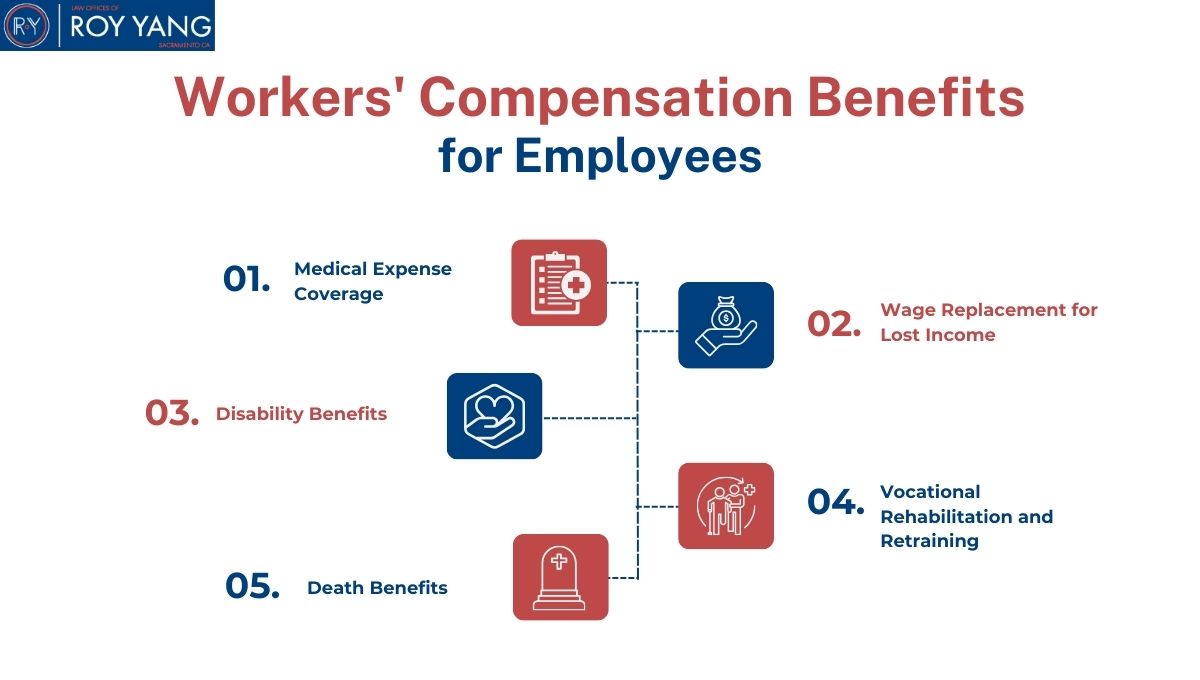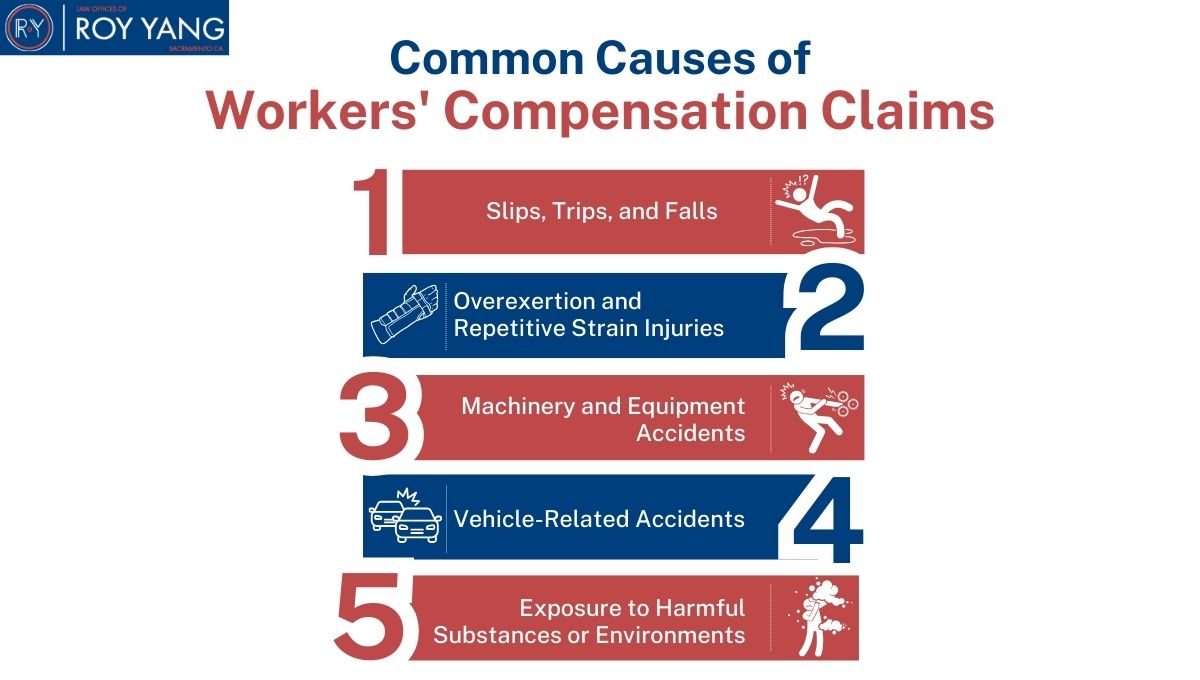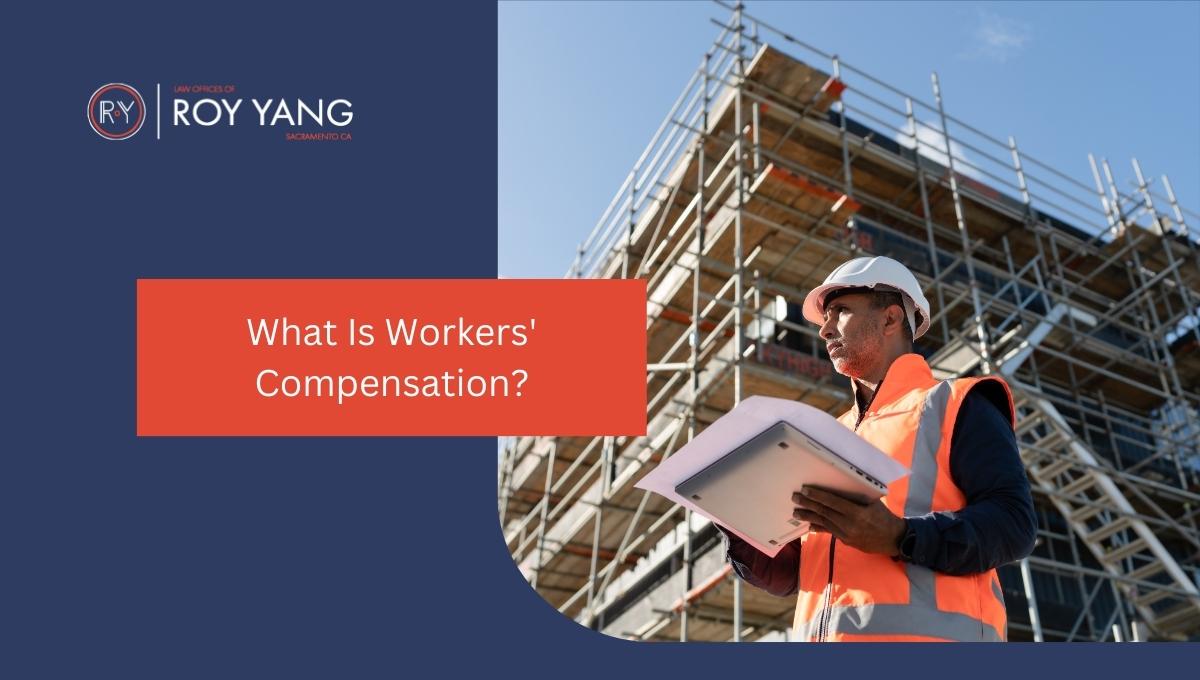What is workers’ compensation? It’s your right to receive financial support and medical care if you’re injured at work. Without it, injuries can lead to crippling medical bills and lost wages. Workers’ compensation covers hospital expenses, wage replacement, and disability benefits for victims—all without needing to prove fault. In parallel, it also protects employers of victims injured on the job from most major lawsuits. Since 1911, the Occupational Safety and Health Administration (OSHA) and state labor boards have ensured fairness and workplace safety. Roy Yang Law is here to carry out OSHA’s mission of protecting workers and help you take control of your recovery, understand your rights, and get the support you need.
Key Takeaways
- Workers’ comp covers medical bills, lost wages, and disability if you’re hurt, at no need to prove fault.
- Most employees qualify; contractors, freelancers, and volunteers usually don’t.
- Your employer pays for the insurance required by law.
- You can get care, retraining, disability pay, or even death benefits for your family.
- Claims get denied if you wait too long, break the rules, or use the wrong doctor.
- A lawyer can help if your claim’s denied or your boss pushes back.
Why Workers' Compensation Is Important for Employees and Employers?
Workers’ compensation is important because it protects injured employees and lowers risk for employers. It offers financial coverage for workers and reduces legal exposure for businesses.
Benefits for Employees:
- Medical Coverage: Pays for treatment, medication, and rehabilitation after a job-related injury.
- Wage Replacement: Provides a portion of lost income while the employee recovers.
- Disability Benefits: Supports workers with permanent or temporary disabilities caused by work.
- Job Security: Encourages return-to-work programs that reduce long-term unemployment.
Benefits for Employers:
- Legal Protection: Shields businesses from most injury-related lawsuits.
- Reputation Control: Prevents public backlash from unresolved claims.
- Workforce Stability: Helps injured employees return faster, reducing turnover.
- Regulatory Compliance: Meets requirements from OSHA and state labor laws.
Who Is Eligible for Workers’ Compensation?
Eligibility for workers’ compensation depends on job status, injury cause, and state law. Most employees injured while performing job duties meet the requirements to file a claim.
Workers Usually Eligible:
- Full-time Employees – Covered by default in all states.
- Part-time Employees – Eligible if injured while working.
- Seasonal Workers – Covered during their active employment period.
- Undocumented Workers – Protected in many states, including California and New York.
Workers Often Not Eligible:
- Independent Contractors – Excluded unless misclassified as employees.
- Freelancers and Gig Workers – Not covered under most state laws.
- Volunteers – Covered in limited cases, depending on state policy.
- Business Owners – Must opt into coverage voluntarily.
To Qualify, Workers Must:
- Suffer an injury or illness caused by job duties
- Report the incident within the state’s deadline
- Receive care from approved providers (if required by the state)
- Work for an employer that carries valid workers’ compensation insurance
Who Pays for Workers’ Compensation?
Employers pay for workers’ compensation through insurance or self-funded programs. Employees are never required to contribute.
How Employers Fund the System:
- Private Insurance: Most businesses buy coverage from approved insurers.
- State Funds: Some states offer public insurance options.
- Self-Insurance: Large companies may handle claim costs directly if approved by the state.
Types of Cost Burdens for Employers:
- Direct Costs: Premiums, claim payments, or legal fees.
- Indirect Costs: Downtime, temporary staffing, and training replacements.
Workers’ compensation laws in every state require employers to cover these costs. OSHA and labor departments monitor employer compliance.
Understanding Workers' Compensation Benefits for Employees
Workers’ compensation offers financial and medical support after a workplace injury. It helps injured employees recover and rejoin the workforce. The various kinds of workers’ comp benefits include:
Medical Expense Coverage
Workers’ compensation covers medical care needed to treat a job-related injury. This includes:
- Emergency room visits
- Surgery and hospitalization
- Physical therapy and rehab
- Prescribed medication
- Medical equipment like crutches or braces
Most states require treatment from authorized providers. Unauthorized care is often not reimbursed. Covered services depend on what workers’ comp covers, which varies by state and injury.
Wage Replacement for Lost Income
Workers’ compensation replaces a portion of lost income after a job-related injury. This benefit is called Temporary Total Disability (TTD).
- TTD usually pays two-thirds of the worker’s average weekly wage
- Most states apply a 3–7 day waiting period before benefits begin
- Retroactive pay is available if the disability extends beyond the waiting period
Example: A $900 weekly wage results in approximately $600/week in TTD benefits, depending on state rules.
Disability Benefits (Temporary vs. Permanent)
Workers’ compensation provides temporary or permanent disability benefits based on injury severity. Some employees may qualify for additional state support, such as California disability insurance.
| Type | What It Is | How Long It Lasts | Who Qualifies |
|---|---|---|---|
| Temporary Disability | Short-term injury | Ends when cleared to return | Must miss work due to injury |
| Permanent Partial Disability | Lasting injury, limited work ability | May be lifetime or capped | Based on impairment rating |
| Permanent Total Disability | Can’t return to any work | Lifetime payments | Must prove total disability |
Vocational Rehabilitation and Retraining
Vocational rehab is provided when a doctor confirms the worker cannot return to their previous job. Services include:
- Job training and new skill development
- Resume writing and interview prep
- Tuition for certifications or new roles
Death Benefits
Workers’ compensation pays weekly death benefits to qualifying dependents such as spouses and children. Some families qualify for survivor benefits eligibility through federal programs like Social Security.
- Payments equal two-thirds of the deceased’s average weekly wage
- Funeral costs are reimbursed, based on state limits
- Payments continue for a set number of years or until dependents reach the legal age

How to Calculate Workers' Compensation Benefits?
Understanding how Workers’ Compensation Benefits are calculated is essential for injured workers to know how much financial support they may receive.
Basic formula:
Benefit = (Average Weekly Wage × State Benefit Rate)
Example:
- Weekly wage = $1,200
- State rate = 66.67%
- Benefit = $1,200 × 0.6667 = $800/week
Which Benefits Are Not Covered Under Workers' Compensation?
Workers’ compensation applies only to work-related injuries and illnesses. Claims are denied when the injury happens outside of work, occurs due to personal actions, or violates company policy.
Benefits Not Covered:
- Injuries Off the Job – “Off the clock” activities (i.e. outside work duties)
- Commuting Accidents – Injuries while traveling to/from work
- Horseplay – Injuries from voluntary, inappropriate behavior
- Policy Violations – Injuries from breaking workplace safety rules
- Mental Stress – Emotional distress not caused by a work event
- Pre-existing Conditions – Only if worsened by work activities
- Substance Abuse – Injuries from drugs or alcohol
- Self-Inflicted Harm – Intentional injuries
How to Get Workers' Compensation Insurance?
Employers must obtain workers’ compensation insurance to cover work-related injuries or illnesses. Here’s how:
- Research Providers – Contact your state or private insurers.
- Compare Options – Look at premiums, coverage, and reputation.
- Check Legal Requirements – Ensure the insurance meets state minimums.
- Get Quotes – Based on the number of employees and industry risk.
- Purchase Policy – Finalize the policy and ensure continued coverage.
How Much Does Workers' Compensation Insurance Cost?
The cost depends on several factors:
- Industry Risk – High-risk industries pay higher premiums.
- Payroll Size – Larger businesses generally face higher premiums.
- Claims History – Frequent claims can lead to increased rates.
How to Meet Workers' Compensation Insurance Requirements in California?
Employers in California must carry workers’ compensation insurance, even ones with only one employee. Requirements include:
- Coverage for All Employees – Includes part-time and temporary workers.
- Reporting Injuries Within 5 Days of Occurrence.
- Penalties levied for non-compliance can exceed $10,000.
How to File a Workers' Compensation Claim?
To file a workers’ compensation claim, follow these steps:
- Report the injury to your employer within 24 hours.
- Seek medical treatment from an approved provider.
- Complete the claim form provided by your employer.
- Submit the completed form to your employer, who will forward it to the insurer.
- Follow up with your employer or insurance company to ensure the claim is processed.
Required Documents:
- Claim form
- Medical records and doctor’s note
- Witness statements
- Employer’s report
- Proof of wages
You will receive an acknowledgment of receipt, followed by an investigation and a final decision. Report injury within 24 hours, file claim within 30 days, and appeal within 1 year if denied.
Learn how to file a workers’ compensation claim to safeguard your rights and ensure you receive fair compensation for your injury.
Are There Any Common Mistakes to Avoid When Filing a Claim?
Avoid these common mistakes when filing a workers’ compensation claim:
- Missing Deadlines – Report within 24 hours.
- Not Reporting to Employer – Always inform your employer immediately.
- Using Unauthorized Doctors – Only visit approved healthcare providers.
- Incomplete Documentation – Keep records of all medical visits and paperwork.
- Not Following Up – Stay in consistent touch (i.e. every 1-2 weeks) with your insurer for updates.
- Assuming Automatic Approval – Regularly check your claim status.
- Failing to Appeal – Appeal within 1 year if denied.
What Are the Most Common Causes of Workers' Compensation Claims?
Common causes of workers’ compensation claims include:
Slips, Trips, and Falls
Slips and falls occur when workers lose balance due to wet floors, uneven surfaces, or obstructions.
Prevention:
- Maintain clear walkways and proper lighting.
- Clean up spills immediately.
- Use non-slip mats where necessary.
Overexertion and Repetitive Strain Injuries
Overexertion happens when workers lift heavy items or overuse muscles. Repetitive strain injuries are common in tasks that require constant motion.
Prevention:
- Use proper lifting techniques (lift with legs, not back).
- Take regular breaks to reduce muscle strain.
- Implement ergonomic tools and setups to reduce strain.
Machinery and Equipment Accidents
Accidents occur from moving parts, machinery malfunctions, or lack of safety training.
Prevention:
- Regularly inspect and maintain machinery.
- Use safety guards and devices.
- Provide workers with adequate training on equipment operation.
Vehicle-Related Accidents
Accidents can occur during work travel or while operating a company vehicle.
Prevention:
- Ensure drivers are trained and certified.
- Maintain regular vehicle checks and repairs.
- Follow road safety rules and avoid distractions while driving.
Exposure to Harmful Substances or Environments
Employees may be exposed to chemicals, extreme temperatures, or excessive noise.
Prevention:
- Use personal protective equipment (PPE).
- Ensure proper ventilation in areas with harmful substances.
- Provide regular safety training on handling hazardous materials.

How Does Workers' Compensation Work in California?
In California, workers’ compensation provides medical benefits and wage replacement for employees injured at work. Here’s an overview of how the system works in the state:
California-Specific Laws & Forms
- DWC-1 Form: This is the official claim form required to initiate a workers’ compensation claim in California.
- California Labor Code: This code governs workers’ compensation, outlining workers’ rights and employer responsibilities in California.
Claim and Appeal Process
- Claims: After filing the DWC-1 form, your employer will send it to their insurance company, which will either approve or deny the claim within 90 days.
- Appeals: If your claim is denied, you can appeal through the Workers’ Compensation Appeals Board (WCAB) within 1 year.
What Happens If Your Workers’ Compensation Claim Is Denied?
If your workers’ compensation claim is denied, follow these steps to appeal:
- Review the denial letter to understand the reason.
- File an appeal with the Workers’ Compensation Appeals Board (WCAB) within 1 year.
- Submit supporting documents like medical records or witness statements.
- Attend the hearing with the judge.
- Receive the decision and appeal further if needed.
Worker’s Rights:
- Appeal the denial.
- Continue treatment during the appeal.
- Seek legal help if necessary.
Do You Need a Workers' Comp Lawyer? When to Hire One?
A workers’ compensation lawyer can help in the following situations:
- Claim Denial: A lawyer can help file an appeal if your claim is denied.
- Disputes Over Benefits: If you receive a low settlement offer or the insurer disputes the claim.
- Complex Cases: If your injury is severe or involves long-term disability.
- Appeals Process: If the claim is denied, a lawyer will represent you in the workers’ comp appeals process.
When Should You Hire a Workers' Comp Lawyer?
- Are you dealing with a denied claim? A lawyer will appeal the decision on your behalf.
- Are you offered insufficient compensation? A lawyer will negotiate for a fair settlement.
- Are you facing severe injuries or ongoing medical disputes? A lawyer will ensure your case is handled properly.
- Are you dealing with long-term disabilities? A lawyer will help secure lifetime benefits.
- Are you unsure about your rights? A lawyer will clarify and protect them.
Learn more about when to hire a workers’ comp lawyer to protect your rights and secure fair compensation.
How Roy Yang Helps You Get the Workers’ Comp Benefits You Deserve?
With over 15 years of workers’ compensation experience, Roy Yang offers expert legal support to secure the benefits to which workers are entitled:
- Skilled Advocacy – Expertise in protecting workers’ rights.
- Tailored Legal Support – A personalized approach to meet individual needs.
- Proven Success – A strong track record of successful settlements in workers’ comp cases.
Workers' Compensation: Benefits and Legal Alternatives?
Workers’ compensation provides financial support for work-related injuries. Key points include:
- Lump Sum vs. Structured Settlements: Lump sum is a one-time payment; structured settlements are periodic.
- Settlement Factors: Injury severity, lost wages, medical expenses, and long-term disability impact settlement amounts.
- Legal Alternatives: Workers may pursue third-party lawsuits if another party is at fault.
How Long Do Workers' Compensation Benefits Last?
Workers’ compensation benefits typically last for 2 years (104 weeks) for temporary benefits. If the injury results in permanent disability, permanent benefits may last for life.
Can I Sue My Employer Instead of Filing For Workers' Compensation?
Yes, you can sue your employer instead of filing for workers’ compensation in cases of gross negligence or intentional harm, or if the employer doesn’t carry workers’ compensation insurance.
Do You Get Paid 100% on Workers' Comp?
No, workers’ compensation typically replaces about two-thirds of your weekly wage while you recover. It does not fully compensate you for lost wages.
What Pays More, Workers' Comp or Unemployment?
Workers’ compensation typically pays more than unemployment benefits, covering both wage replacement and medical treatment, while unemployment only provides wage replacement.
How Long Do Most Workers' Comp Settlements Take?
Workers’ comp settlements typically take between 6 months to 2 years, depending on the case’s complexity, the injury’s severity, and the settlement negotiations.
How Much Is Workers' Comp Insurance for Self-Employed?
Workers’ comp insurance costs for self-employed individuals are around $45 to $67 per month, depending on the industry and the chosen coverage level.
How Much Does a Workers' Compensation Claim Cost a Company?
The cost of a workers’ compensation claim for a company depends on claim frequency and severity. Direct costs include medical expenses and wage replacement, while indirect costs involve higher insurance premiums and training.
Can You Collect Workers’ Comp After Being Fired?
Yes, you can collect workers’ comp after being fired if your injury occurred on the job before termination. Eligibility depends on when and how the injury happened, not your employment status at the time of filing.
Final Thoughts on Navigating Workers’ Compensation Successfully
To ensure your workers’ compensation claim is handled properly, act fast—file immediately and stay vigilant about appeal deadlines. Whether you’re navigating the process in Sacramento, managing a complex case in Folsom, or seeking guidance in Stockton, having the right legal support makes all the difference.
Our experienced workers’ compensation lawyer has helped injured workers across Roseville, Oakland, and throughout California secure the benefits they deserve. We understand the nuances of local claims procedures and how to maximize your compensation within each jurisdiction.
Don’t delay—protect your rights. Contact us today for immediate assistance, wherever you are.



